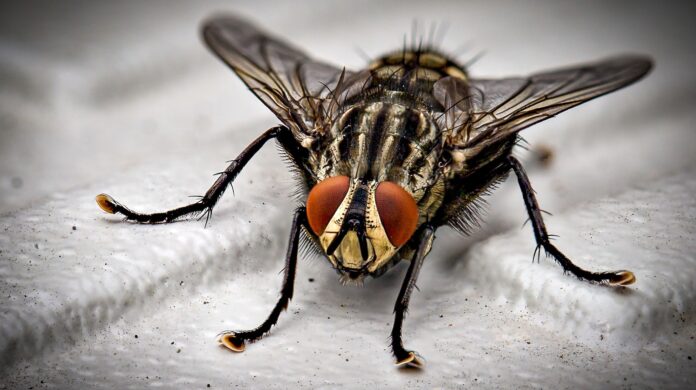What Happens When a Fly Lands on Food
Picture this – we’re enjoying a lovely summer picnic when suddenly, a fly lands on our sandwich. The immediate reaction is to shoo it away but should we continue eating? Let’s dive into the science behind what happens when a fly lands on our food.
Flies can’t chew like us; instead, they spit out digestive enzymes onto their chosen feast. It’s these enzymes that break down the food into slurpable slushies for them. This process of regurgitation isn’t just gross to think about, it also poses potential health risks. Flies pick up bacteria and other harmful pathogens from the various unsavory places they frequent. When they land on our food, these microbes get transferred over.
The types of diseases linked with these bacterial transfers include dysentery, cholera, and typhoid fever – and that’s not something we’d want as a side serving with our meal!
Here are some other facts about flies you might not know:
- They taste with their feet
- Their compound eyes allow them to see in almost every direction simultaneously
- A common housefly lives up to one month
In short, while it may seem harmless (and perhaps slightly annoying) when a fly lands on your food, there’s more happening at the microscopic level than meets the eye. So next time you’re pondering whether or not to eat that slice of pizza after its unwanted visitor has flown off – it might be better to play safe and ditch it!

The Health Implications of Eating Contaminated Food
Eating food that’s been visited by a fly isn’t just unappetizing, it can also be harmful to your health. Flies are known carriers of over 100 pathogens including Salmonella and E.coli. These pathogens can cause illnesses like food poisoning or even more serious conditions such as dysentery.
Let’s dig into the numbers – according to the Centers for Disease Control and Prevention (CDC), each year around 48 million people in the US get sick from foodborne diseases, leading to approximately 128,000 hospitalizations and 3,000 deaths.
Knowing this information doesn’t mean you have to throw away your meal every time a fly lands on it though. It’s all about risk assessment – if you’re at home and a single housefly briefly lands on your lunch before you shoo it away, your risk is relatively low. But if you’re at an outdoor picnic where flies are swarming around the food for extended periods of time? That would significantly increase the chances of contamination.
Do You Eat Meals After a Fly Lands on It
We’ve all been there. You’re about to dig into a meal when an unwelcome guest lands smack dab in the middle of your food. Yes, we’re talking about flies. Now you’re left with a decision: to eat or not to eat? Let’s dive deeper into this issue.
First off, it’s necessary for us to understand the risks involved. Flies are known carriers of diseases such as E.coli and Salmonella. They do so by picking up microbes on their legs and mouths when they feast on things like feces or decaying matter, only to transfer them onto your food upon landing. It’s quite unsettling when we think about it.
However, don’t panic just yet! The risk of contracting diseases from a fly landing on your meal is relatively low according to scientists who study insects (entomologists). But that doesn’t mean we shouldn’t take some precautions. Take these steps if a fly lands on your food:
- Remove the portion where the fly landed
- Ensure that your hands are clean before continuing with your meal
Remember, prevention is better than cure! Keep windows closed while cooking or eating and use screens if possible. Dispose waste properly and keep areas where you prepare meals spick-and-span!


